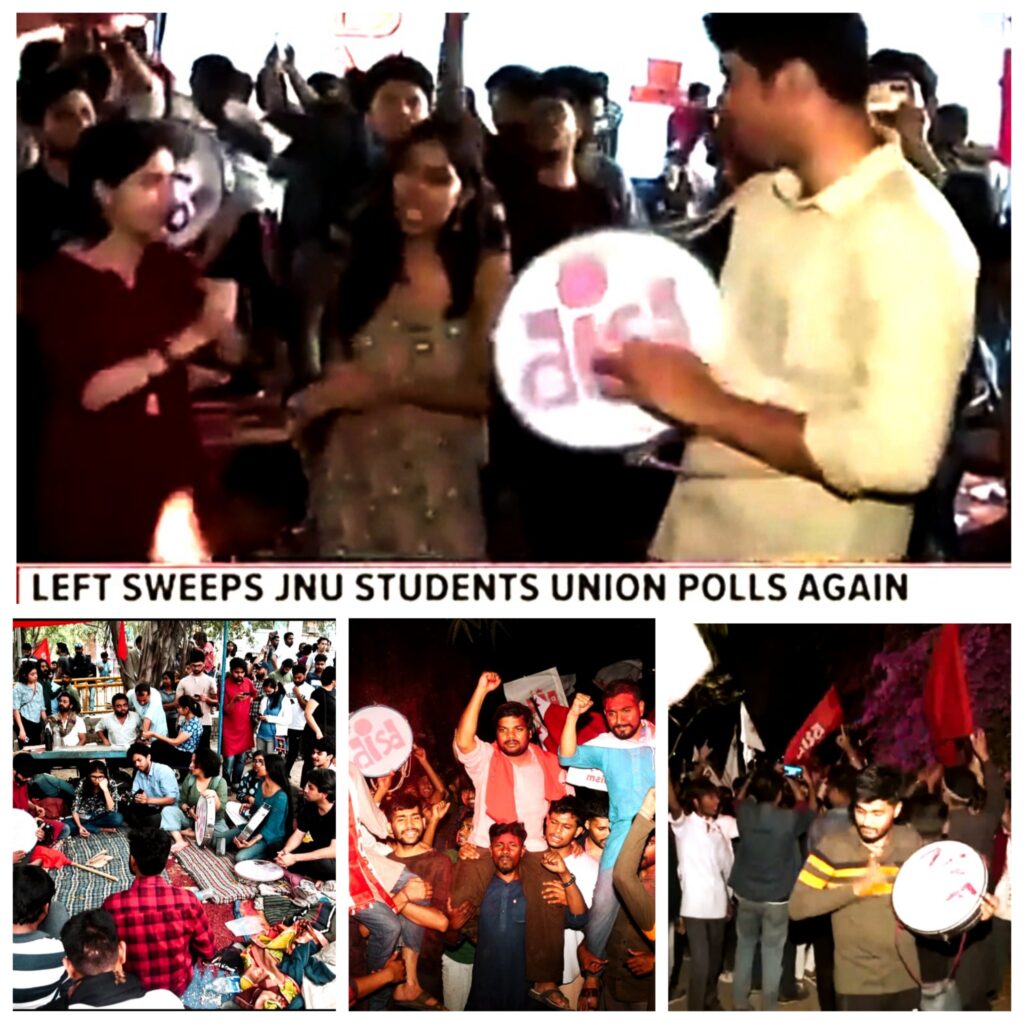Manashimaya

In a resounding victory for left-leaning ideologies, candidates backed by the Left Unity alliance have triumphed in the recent Jawaharlal Nehru University (JNU) Students’ Union elections.
Around 11.30 p.m., on March 24th, 2024, the election committee declared that the United Left panel won three posts at the Jawaharlal Nehru University Students’ Union (JNUSU), while the Birsa Ambedkar Phule Students Association (BAPSA) won one post. The RSS-affiliated Akhil Bharatiya Vidyarthi Parishad lost all the posts by a few hundred votes.
Dhananjay won as the first Dalit president in two decades. Dhananjay of the AISA, who won the president’s post with 2,598 votes, said, “I’m overwhelmed at the support I have received. It has been made clear that the students are unhappy with the government and want things to change.” Hailing from Bihar’s Gaya and pursuing his Ph.D. in Theatre and Performance Studies, Dhananjay is the only Dalit candidate to have won the presidential post in the past two decades.
Avijit Ghosh won the Vice President post. The left candidate, Avijit Ghosh from the SFI won the vice-president post with 2,409 votes.
Mo Sajid won the joint secretary post with 2,574 votes.
General Secretary Priyanshi Arya hopes to bring GSCASH back. The Left Priyanshi Arya, a Dalit queer woman, originally from Uttarakhand’s Haldwani, won the general secretary post with a total of 2,887 votes.
The Left candidate standing for the general secretary post, Swati Singh, was disqualified on Friday, the day the polling happened.
The outcome of the elections underscores the enduring influence of progressive ideals and the support for leftist politics within the vibrant academic community of JNU. The university has long been hailed as a bastion of dissent and intellectual activism, and this electoral victory reaffirms its commitment to these principles.
The Left Unity alliance, comprising various leftist student organizations such as the All India Students’ Association (AISA), Students’ Federation of India (SFI), and Democratic Students’ Federation (DSF), rallied together under a common agenda of social justice.
Amidst a charged atmosphere characterized by spirited debates and campaigning, students came in large numbers to cast their votes, reflecting the deep-seated engagement and political consciousness on campus. The enthusiastic participation demonstrated the significance of student politics as a platform for articulating concerns and shaping the socio-political landscape.
The electoral contest between the Left Unity alliance and the ABVP was emblematic of the broader ideological tug-of-war across the country. While the former championed causes such as affordable education, gender equality, and minority rights, the latter espoused nationalist rhetoric and a conservative agenda, according to a report.
Furthermore, the outcome carries implications beyond the confines of JNU, resonating with similar student movements and grassroots struggles unfolding nationwide. It serves as a potent reminder of the pivotal role, that students play as catalysts for social change and guardians of democratic principles.
However, amidst the celebrations and jubilation over the electoral triumph, challenges lie ahead for the newly elected student representatives. They must now translate their electoral mandate into tangible action, working collaboratively to address the myriad issues, confronting the student community and advocating for a more equitable and inclusive university environment.
As the dust settles on the fiercely contested elections, JNU stands poised at a crucial juncture in its history. The outcome serves as a clarion call for steadfast resistance against some forces seeking to erode the foundational principles of democracy and pluralism. It reaffirms the enduring spirit of dissent and the unwavering commitment to social justice that defines the ethos of JNU.
In essence, the winning candidates from JNU aspire to be agents of transformative change, challenging entrenched power structures and advocating for a more inclusive and equitable society. Their dreams encapsulate the enduring relevance of JNU’s ethos and its potential to shape the trajectory of Indian politics and society for generations to come.
